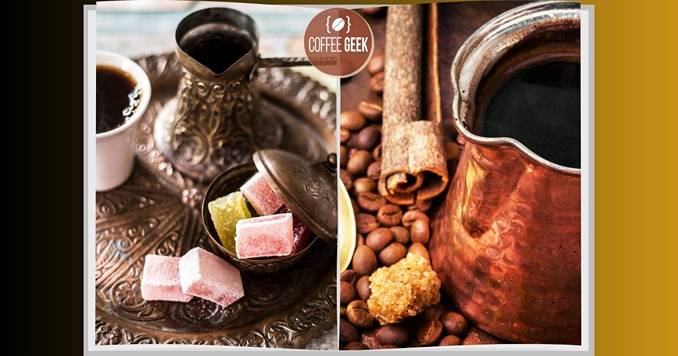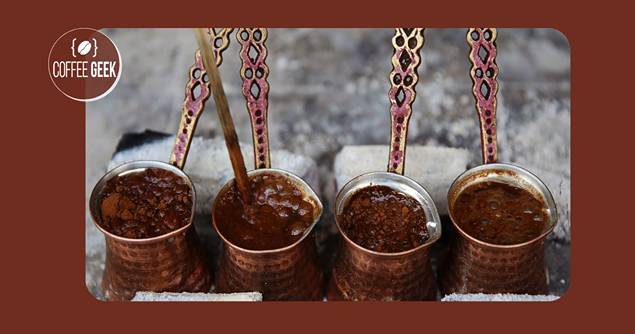Turkish coffee is not only a deliciously rich and aromatic beverage, but it also holds a special place in many cultures, thanks to its unique preparation and serving methods.
As a coffee enthusiast, I’ve always been curious about the caffeine content in my favorite drinks, and Turkish coffee is no exception.
When it comes to the caffeine content in Turkish coffee, you can expect it to have an average of between 40-60 mg per serving.
However, this amount can vary greatly depending on the coffee beans used, the amount of ground coffee, and the brewing method.

In comparison to other popular coffee beverages, Turkish coffee offers a fairly moderate level of caffeine, making it an enjoyable choice for those looking for a strong taste without an intense jolt of energy.
How Much Caffeine in Turkish Coffee Key Takeaways
- Turkish coffee contains an average of 40-60 mg of caffeine, with variations depending on factors like coffee beans and brewing methods.
- Compared to other coffee drinks, the caffeine level in Turkish coffee is relatively moderate.
- This unique beverage is not only rich in flavor but also steeped in cultural and customary elements.
Caffeine Content in Turkish Coffee
When I drink Turkish coffee, one of my concerns is the caffeine content. I’ve found that the caffeine content can vary between 40-60 mg per serving.
This is mainly due to factors such as the amount of coffee used while brewing and the brewing methods themselves.
So, my caffeine fix could be on the moderate side, although it may be different for each person.
I’ve also learned that Turkish coffee uses around 10g of coffee per 100 ml of water.
This is compared to filter coffee, which uses about 6g of coffee per 100 ml of water, and espresso, which uses a whopping 50g of coffee per 100 ml of water.
The high concentration of ground coffee may lead to a higher caffeine concentration in some cases.

According to some studies, the mean caffeine concentration in Turkish coffee is about 165 mg per cup.
This means that one serving of Turkish coffee could have nearly twice as much caffeine as a regular cup of brewed coffee, which contains an average of 95 mg of caffeine.
However, it’s important to note that this is just an average and may not hold true for every person’s cup of Turkish coffee.
In summary, the caffeine content in my cup of Turkish coffee may vary depending on several factors, but it generally falls in the range of 40-60 mg.
It’s important for me to keep the potential high caffeine concentration in mind, especially if I’m sensitive to caffeine or planning to enjoy more than one cup in a sitting.
Comparing Turkish Coffee to Other Beverages
When I think about the caffeine content in various beverages, Turkish coffee stands out as a popular choice with a notable caffeine kick.
With 25 mg of caffeine per fluid ounce, it’s definitely stronger than most varieties of coffee, including drip coffee, which averages around 12 to 16 mg per fluid ounce.
Now, let’s talk about espresso. Although Turkish coffee is strong, espresso is still the heavyweight champion, boasting a hefty 63 mg of caffeine per fluid ounce.
So, if you’re looking for the most buzz in the least amount of liquid, espresso takes the cake.

Tea, on the other hand, typically contains 20 to 60 mg of caffeine per 8 fluid ounces, making it a more gentle pick-me-up compared to Turkish coffee.
That said, the taste and caffeine content can vary widely depending on the type of tea, from a soothing chamomile to a more invigorating green tea.
For those who prefer the convenience of instant coffee like Nescafe, the caffeine content may not be as high as Turkish coffee, but it varies between 30 to 90 mg per 8 fluid ounces depending on preparation style and the brand you’re using.

In terms of more elaborate beverages like lattes, the caffeine content can vary widely, too.
Typically, a latte includes one or two shots of espresso, so you’re looking at around 63 to 126 mg of caffeine in a cup, depending on the size and number of espresso shots.
So, as someone who enjoys various caffeinated drinks, I appreciate Turkish coffee for its rich flavor and distinctive caffeine content.
It’s a unique and delicious way to enjoy a stronger dose of coffee, while still leaving room for the other caffeinated options in my life.
Turkish Coffee Preparation and Serving
When it comes to preparing Turkish coffee, I like to start with fresh, finely ground coffee beans.
The consistency should resemble powdered sugar, and believe me, it does make a difference in the taste.
I’ve found that using a copper cezve (a small coffee pot) not only adds to the authenticity, but also helps in evenly distributing heat during the brewing process.
Now, the method of preparation is a bit unique compared to other brewing methods.
First, I usually combine my coffee grounds and cold water in the cezve, ensuring that the water level is just below the cezve’s spout.
Typically, I use one heaping teaspoon of grounds per 2 1/2-ounce serving.
Remember, Turkish coffee is unfiltered, so using the right amount of grounds is crucial for achieving the desired strength.

Once the coffee and water are mixed, I place the cezve on low heat and gently stir the mixture until the coffee grounds are suspended.
As the coffee starts to heat up, a foam will form on top.
Now, this is the part where I need to be patient – I like to maintain this level of heat until the foam rises just a bit, but not enough that it spills over.
When I see the foam rising, I carefully remove the cezve from the heat and gently scoop out the foam.
I like to distribute the foam equally among the cups because, let’s be honest, that’s where the magic happens!
After that, I return the cezve to the heat and allow the coffee to come to a brief boil.
Once I see the coffee boiling for a few seconds, I take it off the heat and pour it directly into the cups, making sure not to disturb the foam too much.
The coffee grounds will settle at the bottom of the cups, so I like to serve it immediately and let my guests enjoy the unique taste and strength of Turkish coffee.
Remember, this method of preparation is part of the experience, so take your time and enjoy the process.
Unique Ingredients and Flavors
While savoring my favorite cup of Turkish coffee, I can’t help but appreciate the rich taste and aroma that comes from its unique ingredients and flavors.
One of the key components of this delicious beverage is the use of high-quality Arabica beans.
These beans are known for their low acidity, smooth taste, and exquisite flavor profile, which undoubtedly contributes to Turkish coffee’s rich flavor.
In addition to Arabica beans, Turkish coffee recipe is often flavored with various spices such as cardamom and cinnamon.
Personally, I enjoy the refreshing zing of cardamom in my coffee, which complements the dark, robust flavors perfectly.
Sometimes, I also like to spice it up with a touch of cinnamon, which adds a warm and comforting aroma to the mix.

Another interesting aspect of enjoying Turkish coffee is the accompaniment of traditional sweets like Turkish delight.
I find that savoring a piece of Turkish delight alongside my brewing coffee enhances the overall experience.
The sweet, chewy morsels of candy pair wonderfully with the strong, bold flavors of the coffee, providing the perfect balance of bitterness and sweetness.
Lastly, I have noticed that a variety of flavored Turkish coffees have been popping up in coffee shops lately, including variations like mastic, hazelnut, caramel, or vanilla flavors.
While I haven’t tried all of them yet, I’m intrigued by the fusion of traditional ingredients with contemporary flavors, which help keep the making Turkish coffee experience fresh and exciting.
Health Implications of Turkish Coffee
I’ve always been fascinated by the rich and bold taste of Turkish coffee. But more than that, I wanted to know about the health implications of this delightful beverage.
So let’s dive in and find out!
When it comes to health benefits, making Turkish coffee is pretty impressive. It’s loaded with antioxidants that help protect our bodies from various diseases.
Not to mention, it contains several vitamins and minerals that boost our immune system.
I’ve even read that the ritual of drinking Turkish coffee can alleviate anxiety since it’s considered a social activity.
Sharing a cup with friends or family can create a calm and enjoyable atmosphere.
But, every coin has two sides, and the same goes for Turkish coffee.
I found out that for some individuals, especially those with type 2 diabetes, excessive caffeine consumption could lead to a negative impact on blood sugar levels.
Additionally, too much caffeine might worsen anxiety symptoms for those already prone to it. So moderation is key!

Liver cancer prevention is another potential health benefit of Turkish coffee. One study I came across mentioned that drinking this kind of coffee might lower the risk of liver cancer.
However, more research is needed in this area, so I wouldn’t entirely rely on brewing Turkish coffee for liver cancer prevention just yet!
That being said, I must admit that the heart-pounding potency of Turkish coffee might not be for everyone.
The high caffeine content can lead to side effects like jitteriness, increased heart rate, and sleep disturbances if you’re not accustomed to it.
Drinking too much can result in caffeine overdose, which is definitely something you want to avoid.
In summary, enjoying Turkish coffee recipe in moderation is the way to go! It can offer some helpful health benefits, but overdoing it may lead to unwanted side effects.
So, sit back, enjoy a cup, and savor the rich taste and cultural experience that Turkish coffee brings.
History of Turkish Coffee
When I first discovered Turkish coffee, I was fascinated by its rich history and the role it played in shaping coffee culture and traditions.
It all began in the Ottoman Empire, which spanned three continents, including parts of Europe, the Middle East, and North Africa.
The empire adopted coffee as one of its most prized beverages, and it soon became an essential part of daily social life.
Coffee was introduced to the Ottomans in the 16th century, and it quickly gained popularity among the people.
They developed their unique way of preparing it, which we now know as Turkish coffee.
I learned that it involves finely ground coffee beans, combined with water and sugar, and traditionally brewed in a special pot called a cezve.
The resulting coffee is served unfiltered, creating a rich taste and thick texture that sets it apart from other methods.

One remarkable aspect of Turkish coffee is the significance and symbolism that surrounded its consumption.
Throughout the empire, it was seen as a display of hospitality and friendship.
In fact, when the coffee eventually spread across Europe and the Middle East, it took with it the rituals and customs that had developed around it in the Ottoman Empire.
I also found it interesting how Turkish coffee beans played a role in social customs and traditions.
For example, in Turkey, it is still common for a prospective groom to visit his future bride’s family and be offered a cup of Turkish coffee.
The sweetness of the coffee served often serves as a metaphor for the sweetness of the marriage to come.
Cultural and Customary Elements
When it comes to Turkish coffee, there’s a lot more to it than just the caffeine content.
Like any other coffee tradition around the world, Turkish coffee has its own unique customs and elements.
Here, let me tell you about some of the fascinating aspects of it.
First of all, Turkish coffee taste is quite different from other brewing methods like the French press or Italian espresso.
The beans are ground to an ultra-fine consistency, much finer than a typical espresso grind, which creates a distinct, bold flavor profile.
And yes, Turkish coffee is indeed stronger than regular coffee, both in terms of taste and caffeine content.
In addition to the taste, the preparation method is an important aspect of Turkish coffee culture. Traditionally, it’s brewed in a small copper pot called a cezve.
The coffee grounds, water, and sugar, if desired, are combined in the cezve and heated until the mixture starts to froth.
Then it’s poured into small cups without any filtering, which means that the grounds settle at the bottom of the cup.

Now, let me tell you about the social aspect of this coffee culture. Turkish coffee is often enjoyed in the company of others and serves as a symbol of hospitality.
It can be accompanied by a sweet treat like baklava or Turkish delights to balance out the strong, bold flavor of the coffee drinks.
Chatting with friends and family while sipping on a cup of brew Turkish coffee is a popular pastime, and it’s considered an integral part of the Turkish heritage.
In conclusion, the cultural and customary elements of Turkish coffee caffeine go beyond just the flavor and caffeine content.
The brewing method, social aspects, and accompanying treats all contribute to the rich tradition that makes Turkish coffee a unique and beloved part of the coffee world.
Frequently Asked Questions
How does Turkish coffee’s caffeine content compare to espresso?
Comparing espresso and Turkish coffee, I’ve noticed that Turkish coffee generally has more caffeine per fluid ounce. An 8-ounce serving of traditional Turkish coffee contains around 200 mg of caffeine, while an espresso shot has about 63 mg of caffeine. So, Turkish coffee cups have more caffeine per ounce compared to espresso.
Is Turkish coffee caffeine content more than Nescafe?
Yes, Turkish coffee typically contains more caffeine than Nescafe. As I mentioned earlier, an 8-ounce cup of Turkish coffee has about 200 mg of caffeine. In comparison, an 8-ounce cup of Nescafe instant coffee contains roughly 65-100 mg of caffeine. Clearly, Turkish coffee packs a stronger caffeine punch.
How much caffeine is in a gram of Turkish coffee?
The caffeine content per gram of coffee varies depending on factors like the type of coffee bean used and the brewing process. However, it’s challenging to provide an exact amount of caffeine in a gram of Turkish coffee specifically. Although, a typical 2 1/2-ounce serving of Turkish coffee contains about 50 mg of caffeine.
What’s the difference in caffeine between Turkish coffee and regular coffee?
The main difference between Turkish coffee and regular coffee is the brewing method and the coffee grinds used. Turkish coffee uses very finely ground coffee beans, and it’s brewed unfiltered. This results in a higher caffeine content per fluid ounce compared to regular coffee. For instance, an 8-ounce cup of Turkish coffee has 25 mg caffeine per fl oz, while a cup of regular coffee typically has about 12-20 mg caffeine per fl oz.
How much caffeine is in a teaspoon of Turkish coffee?
It’s difficult to determine the exact caffeine content in a teaspoon of Turkish coffee, as it largely depends on the coffee beans used and the brewing process. However, knowing that a 2 1/2-ounce serving of Turkish coffee has 50 mg of caffeine, we can estimate that a teaspoon, which is about a third of an ounce, contains around 6 to 10 mg of caffeine.
How much caffeine is in a typical cup of Turkish coffee?
A typical cup of Turkish coffee has a higher caffeine concentration than regular drip coffee. As I’ve found, an 8-ounce cup contains around 200 mg of caffeine, while a smaller 2 1/2-ounce serving has approximately 50 mg of caffeine. So, if you’re looking to wake up or need a quick pick-me-up, Turkish coffee is an excellent choice!

